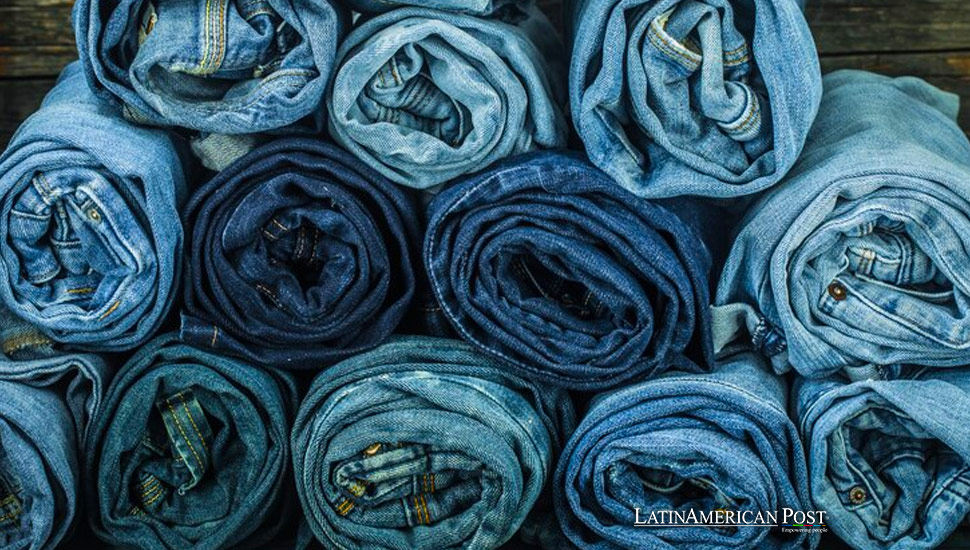The Birth of Upcycled Denim in Latin America

At the 81st edition of Intermoda in Mexico, the spotlight was on sustainable fashion, showcasing the innovative upcycling efforts of designers like Ángela Contreras. With a focus on reusing denim, these collections emphasize the importance of circular economy and recycling in the fashion industry.
In an era where sustainability and environmental consciousness are becoming crucial in every industry, the fashion world is no exception. The 81st edition of Intermoda, a prominent fashion and business platform in Mexico, has brought this issue to the forefront. Among the many dazzling showcases, the upcycled denim collection by Ángela Contreras, designer of the brand Ángela y Dolores, stood out, highlighting the importance of circular economy and recycling in fashion.
Ángela Contreras, a Chilean designer based in Mexico, is dedicated to ‘upcycling,’ transforming old, unused garments into new fashion pieces. During the Intermoda event, she presented a collection that reused over a hundred discarded items, focusing primarily on denim, a fabric known for its heavy environmental footprint during production. “Denim is a highly polluting material in its production process. Mexico is the third-largest producer of denim in the world. We wanted to start rescuing this material from second-hand pieces to create new ones, all made from scratch,” Contreras told EFE.
The collection featured shirts made from patchwork with various prints, jeans, and jackets assembled from different parts of other pants, vests, blouses, dresses, and skirts for both men and women. Combat boots in black, silver, and bright colors complemented these, giving the collection a distinct urban flair.
Designer Mario Galaviz, Contreras’ partner, incorporated hand-embroidered designs to add a unique touch to these upcycled pieces. These embellishments were based on the shades of denim but combined with colors like purple, black, lilac, and gray. This artistic addition enhanced the aesthetic appeal of the garments and underscored the versatility and potential of upcycled fashion.
Breaking Gender Stereotypes and Embracing Inclusivity
Apart from promoting recycling and material reuse, Ángela y Dolores’ collection aimed to break free from gender stereotypes and cater to all body types. Galaviz emphasized the need for clothing that adapts to human bodies’ diverse and evolving nature. “People always asked who the jacket was for, and the truth is, bodies have grown so much, we all do different activities, and meeting a specific size isn’t always feasible. So we started making them a bit oversized, with more fit. Who is it for? For anyone who wants to wear it,” he explained.
This inclusive approach reflects a broader trend in the fashion industry towards creating gender-neutral and body-positive clothing. By designing garments that can be worn by anyone, regardless of gender or body type, Ángela y Dolores is not only expanding their market reach but also promoting a more inclusive and accepting fashion culture.
Intermodal: A Hub for Fashion Innovation
Intermoda, held from Tuesday to Friday, has established itself as a significant event in the fashion industry, bringing together over 1,150 exhibiting brands and more than 24,000 buyers in a sprawling 49,000 square meters of exhibition space at Expo Guadalajara. This year, the focus on sustainability and innovative fashion solutions like upcycling has been more prominent than ever.
The event provided a platform for designers and brands to showcase their latest collections and innovations, attracting industry professionals from across Latin America and beyond. It also offered numerous opportunities for networking, collaboration, and business development, reinforcing its role as a crucial hub for fashion and business.
The Impact of Upcycled Fashion
Intermoda’s emphasis on upcycling and sustainable fashion aligns with a growing global awareness of the fashion industry’s environmental impact. The traditional linear fashion model of “take, make, dispose” is increasingly being replaced by a circular economy approach, which focuses on designing out waste and keeping materials in use for as long as possible.
In Latin America, where many countries are major textile producers, the shift towards sustainable practices is not only environmentally beneficial but also economically advantageous. By adopting upcycling and other sustainable methods, designers and manufacturers can reduce costs, minimize waste, and create unique, high-value products that appeal to eco-conscious consumers.
Moreover, initiatives like Ángela y Dolores’ upcycled denim collection can inspire other designers and brands to explore sustainable practices. This collective effort can significantly reduce the fashion industry’s environmental footprint in the region, contributing to global sustainability goals.
The success of Ángela y Dolores at Intermoda is a testament to the potential of sustainable fashion in Latin America. As more designers and brands embrace upcycling and other eco-friendly practices, the fashion landscape in the region is poised for a transformative shift. This movement addresses pressing environmental concerns and opens up new opportunities for creativity and innovation in design.
Educational programs and industry initiatives can further support this transition by raising awareness about the benefits of sustainable fashion and providing resources for designers to implement eco-friendly practices. By fostering a culture of sustainability, the Latin American fashion industry can lead the way in creating a more responsible and resilient future.
Intermoda 2024 has highlighted the crucial role of sustainability in the fashion industry, with Ángela y Dolores’ upcycled denim collection leading the charge. By transforming discarded garments into stylish, inclusive fashion pieces, Ángela Contreras and Mario Galaviz set a powerful example of how creativity and sustainability can go hand in hand.
Also read: Interstellar Cowboys: Business and Fashion Converge in Latin America
As the fashion industry in Latin America continues to evolve, the emphasis on upcycling, recycling, and inclusivity will be essential in driving positive change. With the support of industry events like Intermoda and a growing community of eco-conscious designers and consumers, the region is well on its way to a sustainable fashion revolution.





